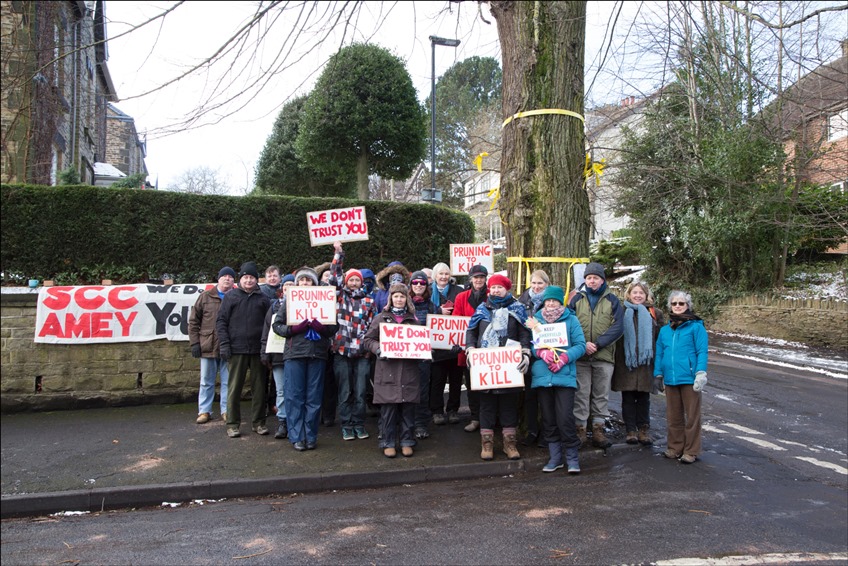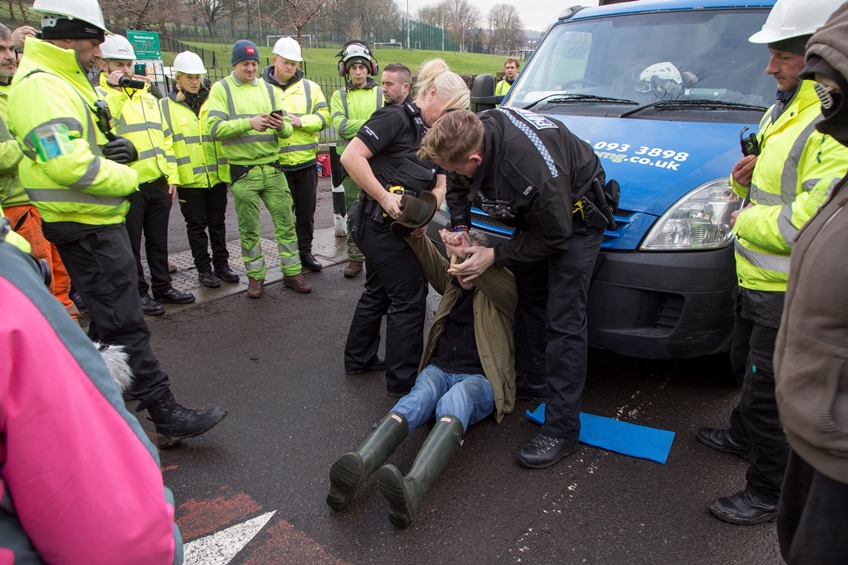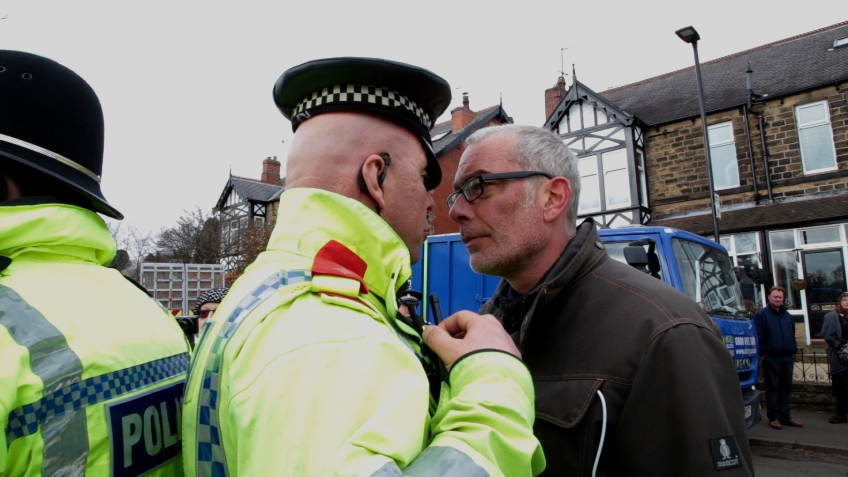Joyce Glasser reviews The Felling (December 9, 2022) Cert 12A, 117 mins
If the title of Eve and Richard Wood’s shocking, yet punch-the-air-inducing documentary sounds like a horror movie it’s intentional. This is not a conventional horror movie, however, for when the concerned residents of Sheffield speak of “carnage” they are referring to senseless killing of healthy, mature trees and no CGI or prosthetics are used. The Felling is a satisfying David vs Goliath tale of how a group of residents worked tirelessly to create awareness of the felling and then risked criminal records to stop or slow it. At the risk of giving away the cathartic ending, the sheer waste and senselessness of it will get your blood boiling.
After a caption-laden opening, the cinema-verité footage opens with a scene straight out of a crime scene investigation series. Men in high-viz vests in the dead of night are standing in what could be a wood on the side of the road, as though searching for a missing person or dead body. But the truth is stranger.
The men are employees of a Spanish owned multinational company Amey, and they are working under a contract with Sheffield City Council (SCC) to ultimately destroy 17,500 healthy trees: not short-lived conifers used for timber, but mighty oaks, chestnut trees, cherry trees and other varieties that enrich bio-diversity.
The captions explain that in 2012, a cash-strapped Council signed a PFI highway contract with Amey, worth £2.2 billion and lasting 25 years. During the first five years, Amey had the task of resurfacing 3,000 miles of roads and pavements. To accomplish this, SCC and Amey claimed that 6,000 street trees would have to be felled by the end of 2017.

Residents challenged the claims through petitions and a court injunction to stop the felling. Like Network Rail’s powers to eradicate trees and foliage that might disrupt the trains and leave graffiti-covered, derelict substations to blight neighbourhoods, SCC and Amey’s powers trumped the protests of “a group of fanatics.”
So these fanatics, mothers, fathers, grandparents, and Benoit, the French troubadour; ordinary retired and working people from all walks of life, resort to a cat and mouse game of non-violent action. They begin by standing under trees to stop the felling. In November 2016, SCC and Amey retaliate by launching, with the help of the police, Operation Testate, by which Amey work under cover of night to commit a “tree massacre” on Rustlings Road.
This is the footage that opens the film, and where local photographer, Jacqui Bellamy (the film’s ‘shooting editor-producer) begins to film the tree campaign.
The campaigners use social media to alert one another where the felling is going on or about to happen so anyone in the area can rush to the scene before work, before the school run, or after work. When the police issue threats and make arrests under part V, section 241 of the Trade Union and Labour Relations (Consolidation Act)1992, several campaigners are detained. Enter Pro Bono barrister Paul Powlesland to get them off. The police decide they would not use the Trade Union Act again to make arrests. It is not clear whether the court declared the usage of the Act incorrect in general or if Powlesland won on the facts of the particular cases.
On 6 December 2017 at 5AM Paul Brooke notices that five trees had been butchered overnight. The Council overrode their own independent tree panel on which they spent a quarter of a million pounds to fell healthy lime trees for no reason.

Since the campaigners are prohibited from obstructing the highway, they set up barriers in the park and begin leaning against walls that are neither on the pavement nor the road. Amey brings in “bouncers” and, with police, use “reasonable force” to detach the protesters. At one point a campaigner counts thirty police officers surrounding one tree and decries the waste of resources.
Amey are obliged to increase their budget by introducing Heras fences to widen the “safety zone” and prevent campaigners from climbing over or entering. A few brave souls climb up the trees. Paul goes for broke and pushes through the fence, opening the area inside for other campaigners to flood in.
Throughout this cat and mouse game, the campaigners listed at the end of the documentary along with Baroness Jenny Jones from the Green Party, call for transparency. SCC and Amey have always refused to make the contract public. After all, businesses have to protect sensitive strategic information and trade secrets!
But no one outside the “bad guys” had scrutinised the contract. These “bad guys” are duly named and shamed: Paul Billington, then unelected Director of Culture and Environment; Sheffield City Council leader Julie Dore; Councillor Brian Lodge who argues that planting saplings is a commensurate replacement for the 40+ year old healthy mature trees; and Amey Account Manager Darren Butt.
When after years of failure to respond to Freedom of Information Requests, the ICO becomes involved, the campaigners are given hope. When the Forestry Commission begins to take an interest in the FOI requests and the contract, the balance of power begins to shift. Despite this, SCC still try to imprison Paul and other protestors, Benoit Compin and Simon Crump. You will hear the court’s verdict at the very end of the film.
The number 6,000 early on in the film becomes, a bit confusingly, 17,500 at the end. An end caption tells us that the campaign saved approximately 12,000 of the 17,500 street trees that were scheduled for felling in the contract.
The relevancy of this puzzling massacre is highlighted in an article in the Sunday Times of December 4, 2022. We learn that woodland covers just 13% of the UK landmass compared with 30% in Germany and 31% in France. Moreover, of the 80 million new trees a year promised in the Tory Party Manifesto last year, only 13,000 were planted, and fewer than 3,000 in England. Trees are a major defence against floods, pollution and climate change.




